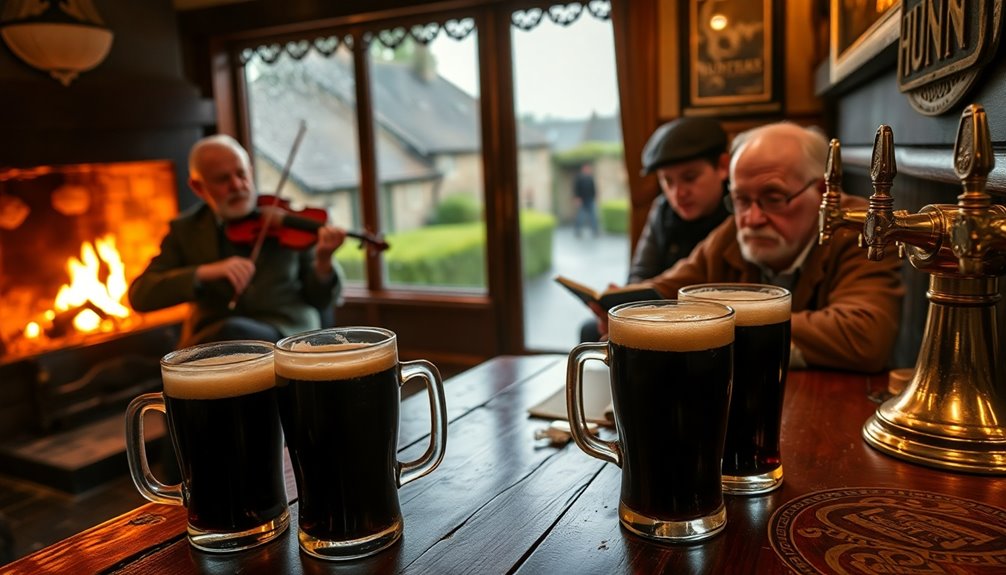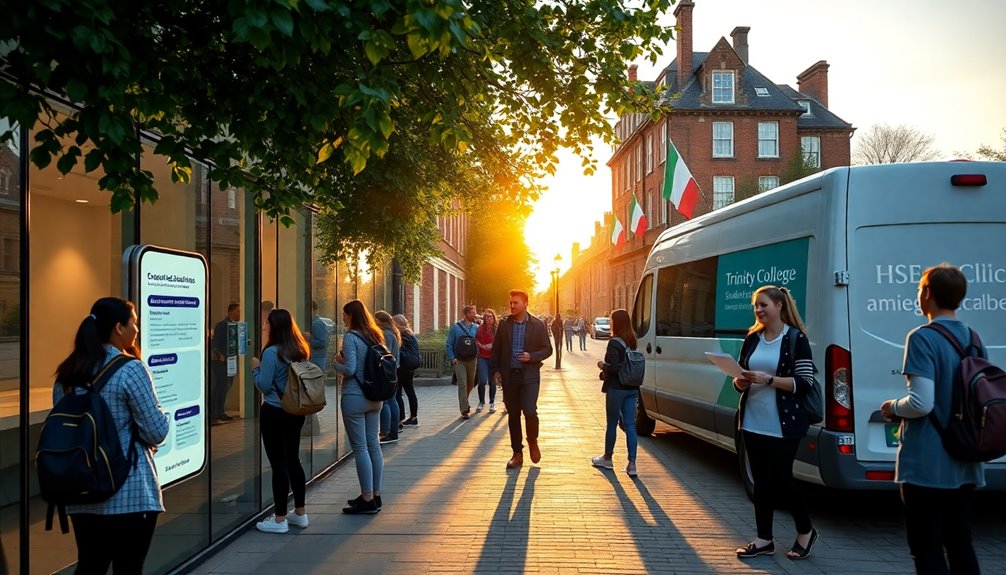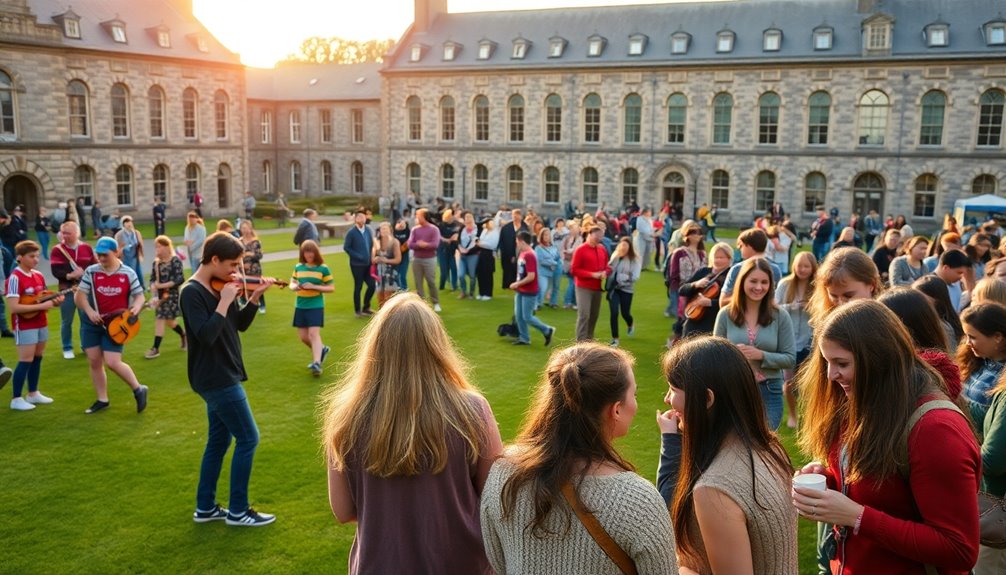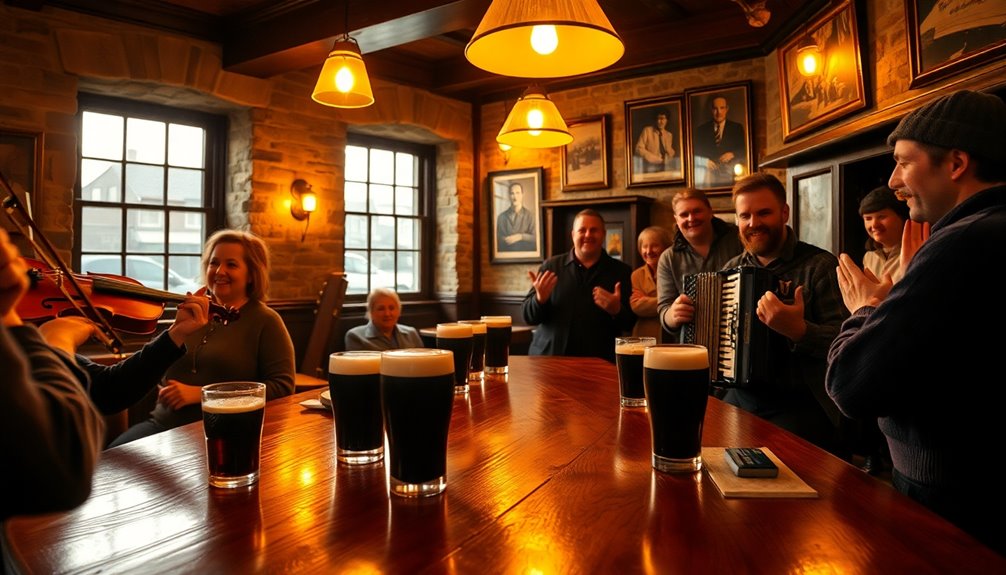
Choose a city that fits your pace, live near campus, and learn the rhythm of pubs, markets and local transport. Say yes to choir practice, a sports club or a weekly farmers’ market to trade stories and time. Find a house-share to save money and cook simple meals from market produce. Listen in pubs, clap, and offer to buy a round when invited. Stay curious and keep showing up — more practical tips and routes to deeper local ties follow.
Highlights
- Spend time in pubs and music sessions: listen, clap, join songs, and buy a round when invited to connect with locals.
- Live near campus or bikeable neighborhoods to balance cost, commute, and spontaneous cultural experiences.
- Volunteer regularly with local clubs, markets, or charities to build meaningful, low-key community ties.
- Explore farmers’ markets and learn budget recipes from vendors and housemates to taste local ingredients and traditions.
- Learn basic Irish phrases, attend festivals early, and observe local etiquette for deeper, respectful engagement.
Picking the Right Irish City for Student Life
Wondering which Irish city will feel like home for your student years? You’ll wander streets where music spills from pubs, weighing whether you want lively nights or quiet cobbled mornings. Picture yourself choosing a place that matches your student lifestyle — compact campuses, bikeable neighborhoods, or buzzing arts quarters. You imagine festivals that teach you local rhythms and galleries that nudge your perspective; cultural experiences become your classroom. Trust instincts about pace, transport, and the people who’ll become your crew. Each city promises freedom to shape your days; pick the one that feels like the map you want to follow.
Finding Affordable Student Housing Quickly
If you need a place fast, start by sketching the essentials—budget, commute time, and what you’re willing to share—and let that map the hunt; city-centre flats bring nights and convenience, outer suburbs give space and savings, and house-shares split bills and chores. You’ll scan listings with a curious eye, trusting instincts as much as photos. Lean into finding roommates through student groups and bulletin boards; meet quickly, ask about rhythms and rules. Be bold when negotiating leases—clarify durations, deposits, and repairs. Move where you can breathe, knowing the right roof can open the city’s secrets.
Navigating Public Transport Like a Local
How do you become part of the city’s rhythm instead of just passing through it? You fold yourself into morning queues, learn bus routes by heart, and watch neighborhoods reveal themselves through windows. You check train schedules like weather — enough to plan, not to be chained. You hop off where laughter spills onto streets, buy a day pass, blend with commuters and late-night singers. Maps become conversation starters; drivers’ names become familiar. You move with intention, curious and unhurried, letting public transport show hidden markets, parks, and faces. Freedom is choosing when to stay and when to go.
Opening a Bank Account and Managing Money
When you step into a bank in Ireland, you’re not just handling paperwork — you’re learning the local way of keeping score, from the rhythm of standing in line to the friendly patience of clerks who’ll explain direct debits and contactless limits. You’ll open an account with ID and proof of address, feel relief as an ATM card arrives, and learn to nip out for groceries without fuss. Watch currency exchange options if you’ve other accounts, set clear budgeting strategies to guard your freedom, and let online banking give you calm control. Money here becomes a practical, quiet companion.
Registering for Healthcare and Student Services

When you arrive, you’ll sift through health coverage options and decide whether public schemes or private plans suit your stay. You’ll register with a local GP, learning the quiet rhythms of appointments and prescriptions that keep you well. Along the way, student support services will be waiting with practical help and small comforts to anchor you.
Health Coverage Options
Before you set off to explore cobbled lanes or enroll in classes, you’ll want to sort out health coverage so that a sudden fever or a sprained ankle doesn’t turn your adventure upside down; registering with Ireland’s health services and your university’s student clinic gives you practical protection and local peace of mind. You’ll weigh health insurance options—private plans, EHIC/GHIC for EU visitors, or student-specific schemes—and check coverage eligibility based on your residency status and course length. Choose a plan that lets you roam freely, travel on a whim, and still reach a reassuring local clinic when the unexpected taps your shoulder.
GP Registration Process
Sorting out health cover is only the start — next you’ll want to register with a local GP so you know where to go if you wake up sick or need a prescription. You stroll into a clinic, paperwork in hand, learning gp registration requirements: ID, proof of address, and your PPS or student details. The receptionist guides you through the gp appointment process—phone or online booking, short wait, clear instructions. You feel practical freedom: prepared, connected, able to explore without fear. This simple civic step roots you in daily life, a quiet key to wandering confidently across Irish streets.
Student Support Services
1 small, decisive step — finding your student services office — will make life here feel suddenly manageable. You walk in, map folded, and someone points to where you register for healthcare and ask about GP lists. They tell you about student counseling tucked down the corridor, quiet rooms where you can breathe. Academic resources are catalogued nearby: drop-in tutors, workshop calendars, bursary advice. You leave lighter, knowing IDs, forms, and where to go when things unravel. Freedom feels practical now; support isn’t holding you back but cutting ropes so you can roam, study, and belong without losing yourself.
Joining University Clubs and Societies Fast

You’ll want to spot the clubs that match your rhythms—music halls for late-night storytellers, rowing sheds for early-morning folks, societies where accents and jokes feel familiar. Once you’ve identified a few, move fast: check sign-up deadlines, follow social pages, and turn up to introductory meetings with a question ready. Joining quickly gets you into the pulse of campus life, and that first friendly face can anchor weeks of new experiences.
Find the Right Club
Want to feel at home fast? You drift through campus flyers, sensing which club types hum with life — music, hiking, debate, language circles — and you follow the ones that make your chest unclench. Picture stepping into a room where strangers become companions; membership benefits aren’t just discounts, they’re invitations: shared routes, late-night rehearsals, salty jokes after rain. Trust the moments that tug; try the club whose rhythms match yours. You’ll learn customs by doing, laugh in accents, trade stories beneath unfamiliar stars. Choosing becomes freedom: pick the place that feels like breathing, and stay until it fits.
Fast Sign-Up Tips
How quickly can you become part of the campus hum? You slip into a courtyard, heart open, eyes scanning posters and faces. With a few decisive clicks — fast registration portals, club newsletters, online resources — you claim your slot. Show up early to a meet-and-greet, introduce yourself with a short, honest line about what draws you here. Carry a notebook, ask two sharp questions, offer to help set up. You’ll be noticed faster when you move with intent and warmth. Freedom isn’t waiting; it’s choosing a group, diving in, then shaping your own place among them.
Learning Everyday Irish Phrases and Pronunciation
Ever wondered how a few well-placed words can open doors in a small Irish town? You’ll learn common phrases that feel like invitations — “Dia dhuit” for hello, “go raibh maith agat” to thank, simple greetings that make strangers smile. Listen closely to pronunciation tips: soften consonants, breathe vowels, mimic rhythm. Walk markets and lanes, repeat phrases with a local, let mistakes become conversation. You’ll taste freedom in each exchanged sentence, confident and curious. Language becomes a key: respectful, playful, alive — a way to belong briefly, then move on with new stories tucked into your pockets.
Experiencing Traditional Music and Pub Culture

With a few familiar phrases tucked into your pocket, step into a pub where language becomes music and music becomes conversation. You drift toward a corner where traditional sessions pulse—fiddles, bodhrán, flute—each tune inviting you to breathe in rhythm. You’ll watch locals trade stories between reels, laugh, and pass a song on like a torch. Follow simple pub etiquette: listen, clap between sets, buy a round when invited. Let the night loosen you; sit close, sway, and let impromptu melodies guide your curiosity. Here, freedom feels like joining a circle that always has room for one more.
Volunteering Locally to Build Community Connections
If you offer a few hours each week to local charities, sports clubs, or heritage groups, you’ll quickly learn what matters in that community. Be clear about the time commitment and expectations up front so your help is meaningful and not a burden. In doing the work alongside residents, you’ll form the casual conversations and shared tasks that turn into lasting friendships.
Local Organizations and Causes
When you step into a local volunteer hub—whether it’s a community garden on a foggy morning or a crowded parish hall sorting donations—you start to feel how everyday life in Ireland is stitched together by small, deliberate acts. You’ll find community engagement varies: heritage groups restoring stone walls, youth clubs teaching music, environmental trusts protecting coasts. Charity opportunities pop up at markets, festivals, and through tidy local notices. Choose causes that match your curiosity and values, and you’ll move beyond visiting into belonging, swapping stories, learning rhythms, and shaping a place that lets you roam freely while giving back.
Time Commitment and Expectations
Because your time is the most honest thing you can offer, volunteering in a local Irish community will quickly teach you how small, regular commitments mean more than grand gestures; expect to trade an afternoon a week or a few concentrated days a month for real relationships, shared routines, and the kind of trust that only forms when you turn up consistently. You’ll feel the rhythm: pubs closing, market stalls dismantled, choir practice starting. Your time investment becomes a quiet pledge against impatience. Learn local cultural expectations—punctuality, listening, offering help without fanfare—and you’ll move freely into community life, welcome and unhurried.
Building Lasting Relationships
Showing up week after week builds trust, but turning that trust into something lasting takes a bit more: shared stories, small rituals, and the willingness to be known. You’ll volunteer at a café, school, or coastal clean-up, learning names and jokes while trading slices of your life for theirs. That cultural exchange loosens edges, teaches local rhythms, and opens doors to invitations you couldn’t arrange alone. Community involvement asks for consistency and curiosity; it rewards you with belonging and invisible threads that tie you to place. Keep listening, keep showing up, and let friendships grow at their honest, unrushed pace.
Exploring Food Markets and Cooking on a Budget
Although you might arrive with just a backpack and a few euros, stepping into Ireland’s food markets quickly shows how far simple ingredients can take you; stalls brim with seasonal produce, freshly baked soda bread, and tangy cheeses that invite tasting and conversation. You wander stalls, meet farmers, and trade stories while assembling cheap feasts — potatoes, cabbage, smoked fish. Learn budget recipes from vendors or fellow travelers, then cook in hostel kitchens, sharing meals and music. You’ll savor honest flavors, practice thrift, and feel free — culinary curiosity becomes a passport to local life and unexpected friendships.
Attending Festivals and Cultural Events Strategically
If you time your trip around a county fair, a céilí, or a tiny town’s harvest festival, you’ll step into scenes where music, language, and food converge and reveal the real rhythm of Irish life. You’ll plan by tracking festival highlights in local listings, choosing events that match your appetite for spontaneity or depth. Arrive early, listen before joining, and follow where conversations lead; you’ll catch dances, storytelling, and recipes that embody cultural traditions. Carry a small notebook, speak a few phrases, and buy local crafts—these moves let you roam freely while honoring places and people who guard the island’s living past.
Making Friends With Local Students and Roommates
How do you slip into the easy rhythms of student life without feeling like an outsider? You start by saying yes: join a study group, linger after lectures, invite a roommate for tea. Share stories and chores; small rituals open doors to cultural exchange that feel organic, not staged. Listen for local slang, trade recipes, swap playlists. Let curiosity guide you through student networks—clubs, noticeboards, late-night conversations—and offer help when you can. Freedom here means moving with intention: be present, take risks, and let friendships grow from daily routine into something belonging and bright.
Short Day Trips to Know Irish History and Landscapes

When you step off a bus or train and the air smells of sea salt or peat smoke, you’re already inside a story that’s older than the map in your pocket; short day trips let you stitch together Ireland’s history and landscapes one vivid stop at a time. You’ll choose Scenic routes that bend past cliffs and bogs, pause at Historical sites whose stones still hum, and linger at Cultural landmarks where songs and soup are offered freely. Join Guided tours when you want context, or wander alone to let wind rewrite your plans—each day trip gives you a small, fierce freedom.
Some Questions Answered
How Do I Handle Homesickness While Studying in Ireland?
You cope with homesickness by building coping strategies that honor both longing and curiosity: send familiar recipes home, journal in cafes, and take wild walks to map new comforts. You’ll seek support networks—classmates, host families, clubs—that become chosen kin. Notice small rhythms: tea at dusk, local music, a friend’s laugh. Each ritual loosens the ache, giving you freedom to explore while keeping a steady thread back to who you are.
Can I Work Part-Time Off-Campus as an International Student?
You can, but it depends — don’t count your chickens yet: as an international student in Ireland you’re usually allowed part-time work, but work regulations limit hours and type of jobs. Student employment’s rules vary by visa and course level, so you’ll need to check your permission to work and register if required. You’ll want flexible, freeing roles that fit study rhythms, keeping paperwork tidy so nothing clips your wings.
What Are Visa Extension and Post-Study Work Options in Ireland?
You can extend your stay by applying to renew your permission to remain and by using the Third Level Graduate Scheme, which gives you time to find work after graduating. Check visa requirements carefully and apply for any necessary work permits if your employer needs one. You’ll feel the freedom of exploring jobs, but stay observant—rules, durations and eligibility vary by course level and nationality, so plan and document everything.
How to Stay Safe During Late-Night Outings in Cities?
Stick to well-lit routes, use reliable nighttime transportation like licensed taxis or official night buses, and tell a friend your plans so someone knows where you’ll be. Keep valuables out of sight, stay aware of your surroundings, and trust your instincts—if a place feels wrong, leave. Move with intention, blend in with locals, and carry a charged phone and tiny emergency cash for freedom to leave whenever you choose.
Are There Cultural Taboos I Should Avoid in Irish Social Settings?
Yes — you should avoid certain taboo topics and mind social etiquette. You’ll steer clear of aggressive politics, sensitive history and personal finance in casual chat; don’t pry about religion or family strife. Be polite, listen, and laugh with restraint until you know people. Offer a toast, respect personal space, and accept invitations graciously. That observant, free-spirited approach keeps conversations warm without trampling local boundaries or creating awkwardness.
Summing Everything Up
You’ve landed in Ireland, and it’s already reshaping you — the laughter in a crowded pub, the scent of peat and sea, the shy kindness of classmates. Keep choosing small risks: a spontaneous day trip, a potluck with neighbors, a late-night bus home. These moments stitch you into place. Remember, like a medieval monk with a smartphone, you’re recording tradition while living it — so savor, learn, and let the island teach you.
